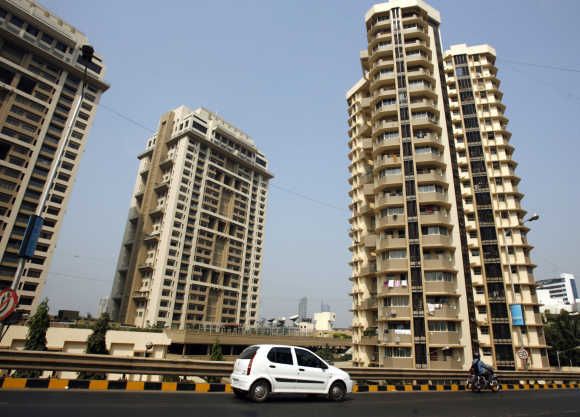 | « Back to article | Print this article |
 Want to participate in the real estate boom without the hassles of complicated documentation? Real Estate and Infrastructure Investment Trusts, or Reits, might be a good option.
Want to participate in the real estate boom without the hassles of complicated documentation? Real Estate and Infrastructure Investment Trusts, or Reits, might be a good option.
With the Securities and Exchange Board of India (Sebi) clearing the deck for launch of Reits on Sunday, investors will have another option – besides direct purchase of property or direct stocks of real estate companies – to participate to the sector’s fortunes.
However, the market regular has kept a higher threshold limit of Rs 2 lakh for investment in Reits, much like the limit in the BSE SME stocks, thereby making it a tad more difficult for retail investors.
Financial planners such as Suresh Sadagopan feel these products would be a good portfolio diversification tool.
“Reits would be safer for individual investors who would otherwise invest on their own in some property or land parcel.
Investing in Reits would be passive investing in real estate market.
Also, the minimum threshold is much lower than investing in any property, which can cost anywhere above Rs 40-45,00,000 even in city suburbs,” he explains.
There are several other safeguards as well. Not less than 80 per cent of the value of the Reit assets shall be in completed and revenue-generating properties – a good move because it ensures that investors enter an instrument that is already generating revenues and not something that will only generate revenues in the future.
This will bring down the risk because entire investment in under-construction properties that promise the moon to investors can hurt badly, if the construction gets stuck due to litigation or other issues.
Similarly, Reits cannot invest more than 60 per cent of the value of assets in two projects.
Besides these checks and balances – high threshold limit and controls over investment – Reits will give an added advantage of dividend distribution on an annual basis and that too, 90 per cent of distributable post-tax income.
At present, dividends would be subject to the dividend distribution tax (DDT) at 16.995 per cent. Dividend subject to DDT is exempt from tax in the hands of the investors.
Balaji Raghavan, CEO of IIFL Alternative Asset Advisors, says that the yield, as a result, will be 8-9 per cent. Add to that, capital appreciation and the total annualised returns may come to 14-15 per cent.
“Though post-tax returns depend on the overall yield, they will certainly be higher than fixed deposits by around three per cent,” says Raghavan.
The liquidity may also not be an issue, according to Rahul Rai, head - real estate investment business at ICICI Prudential, because they will be listed at the stock exchanges.
Reits will be riskier than debt products because the underlying security is real estate, which can take a hit when economic conditions aren’t very suitable since the exposure will only be in commercial properties.
The long-term and short-term capital rates of taxation are unclear. However, Gautam Mehra, executive director, PwC, says the taxation of Reits may have some similarity to that for listed equities, with long-term capital gains on transfer of Reits being exempt (provided it has been subject to STT), and short-term capital gains being subject to a 15 per cent tax, plus applicable surcharge and cess.
“However, Reits units to qualify as a long-term capital asset, they would need to be held for a period of three years,” he says.